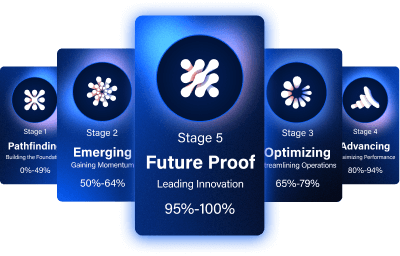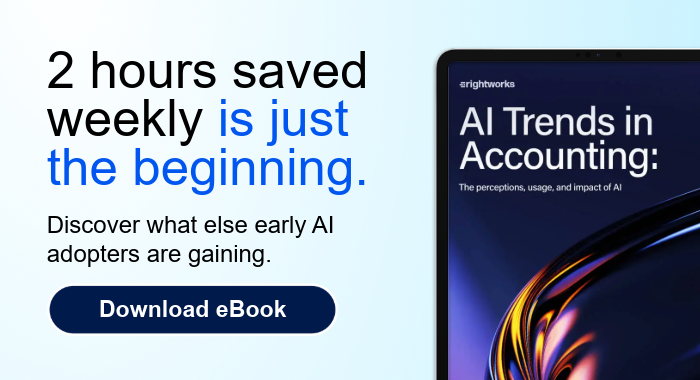With so many new AI tools on the market, it’s tough to figure out exactly which ones are worth the hype. In this post, we’ve done the hard work for you. Click below to jump to the top AI tools in accounting, tax, marketing, sales, and more.
Table of Contents
- AI Influencers in Accounting, Tax, Business & Technology
- Best AI Tools For Accounting & SMB Professionals
AI Influencers in Accounting, Tax, Business & Technology
Follow these influencers for the latest developments in AI technology, its use cases across various industries, and how it’s reshaping business for the better.
| Influencer | Expertise | Where to Find Them… |
| Roman Kepczyk | AI in accounting, tax, and finance | LinkedIn, CPAPA, Rightworks (webinars and blogs) |
| TJ Lewis | AI in accounting, tax, and finance | LinkedIn, Woodard |
| Bernard Marr | AI, business, and technology trends | LinkedIn, Forbes, Personal blog |
| Shelly Palmer | AI and digital transformation | LinkedIn, Personal blog |
| Jason Staats | AI in accounting and finance | LinkedIn, YouTube, TikTok, Spotify, Apple Podcasts |
| John Higgins | AI in business and education | |
| Paul Roetzer | AI in business and marketing | LinkedIn, X, Marketing AI Institute |
| Allie K. Miller | AI and technology in business | LinkedIn, X, LinkTree |
| Ethan Mollick | AI, innovation, and startups | LinkedIn, X, Substack |
Have someone to add to the list? Message us on LinkedIn.
Best AI Tools For Accounting & SMB Professionals
AI + Accounting and Tax
Not only can AI gather and organize tax documents from multiple sources, but it can also scan tax returns for errors or inconsistencies, then flag them for further review. Check out a few of our favorites:
| AI Tool | Key Features | Best For |
| Vic.ai |
|
Streamlining accounts payable processes. |
| SmartVault Accounting Pro |
|
Tax preparers looking to streamline client workflows. |
| 1040SCAN |
|
Tax preparers looking to streamline client document management (and who hate data entry). |
Learn more about how AI is reshaping the tax profession.
AI + Client Management
Including prep work and creating a summary, accountants spend an average of about an hour a day (or five hours a week) in staff meetings. AI meeting tools can record and transcribe meetings, as well as create summaries and action items.
| AI Tool | Key Features | Best For |
| OtterPilot™ |
|
Taking team and client meeting notes. |
| Silverfin Assistant by Visma |
|
Client file and data analysis. |
AI + Bookkeeping
For bookkeepers looking to save time on data processing or SMBs seeking automated bookkeeping, here are the top solutions for you:
| AI Tool | Key Features | Best For |
| Botkeeper |
|
Small to medium-sized businesses seeking automated bookkeeping. |
| Dext Prepare |
|
Businesses seeking efficient expense management and bookkeeping. |
| Docyt |
|
Bookkeepers looking for real-time transaction reconciliation. |
| Nanonets |
|
Finance and accounting professionals looking to simplify reconciliation and improve financial accuracy. |
AI + Marketing
AI marketing tools help craft strategies, create and distribute content, interpret campaign results, and more.
Here are a few of our favorites:
| AI Tool | Key Features | Best For |
| Jasper |
|
Small businesses to enterprises looking to up their marketing strategy. |
| StoryChief |
|
Marketing agencies and teams looking to craft, collaborate and distribute content more effectively. |
| Microsoft Copilot |
|
Microsoft users. |
AI + Writing and Research
Use these to help make researching topics and writing first drafts easier:
| AI Tool | Key Features | Best For |
| Perplexity |
|
Anyone looking to cut down the time it takes to research a topic. |
| Claude by Anthropic |
|
Brainstorming content ideas or speeding up the ghostwriting process. |
| AI Writing Assistant by Grammarly |
|
Anyone who wants to improve their writing. |
AI + Email
AI can sort emails into categories based on importance or urgency. It also allows you to create quick response templates for common client questions, prioritizing communications with clients and your team.
| AI Tool | Key Features | Best For |
| Superhuman |
|
Google and Microsoft Outlook users.
|
| Texta.ai |
|
Anyone looking to organize their inbox and save time emailing. |
AI + Graphic Design
For businesses requiring high-quality imagery, the following AI graphic design and image tools are reigning supreme in the design world:
| AI Tool | Key Features | Best For |
| Adobe Firefly
|
|
Adobe CC users. |
| DALL·E 3 by OpenAI |
|
Anyone (with any amount of artistic ability) interested in creating images. |
| Stable Diffusion by Stability AI
|
|
Graphic designers familiar with GenAI prompting. |
AI + Revenue & Financial Forecasting
Identifying revenue attribution per campaign and projecting financial targets a month, quarter, or year out are often sluggish processes with little room for error.
With the addition of AI to already powerful platforms, those tasks turn from time-consuming brain-melters to simple and quick.
| AI Tool | Key Features | Best For |
| Gong.io |
|
Sales teams. |
| Moby by Triple Whale |
|
E-commerce businesses and data analysts. |
AI + CRM
CRM (customer relationship management) tools are beasts. They track marketing and sales performance, act as a hub of customer data, and make selling and tracking sales data way easier.
For the purposes of this blog post, we’ll focus on the “opportunity tracking” component of the two biggest CRMs: HubSpot and Salesforce.
Both have integrated AI and GenAI into their platform; get more information below.
| AI Tool | Key Features | Best for |
| ChatSpot by HubSpot |
|
HubSpot CRM users. |
| Einstein Copilot by Salesforce |
|
Salesforce users. |
Learn More About AI Tools & Tech
Evaluate your daily tasks; could AI help perform them? Over time, you’ll notice a shift in your workday. Tasks that historically took most of your time will get faster, possibly even eliminated. And suddenly, you’ll have more time for the projects that excite you.
Stay competitive. Stay curious. And to learn more about AI, subscribe to our blog.




